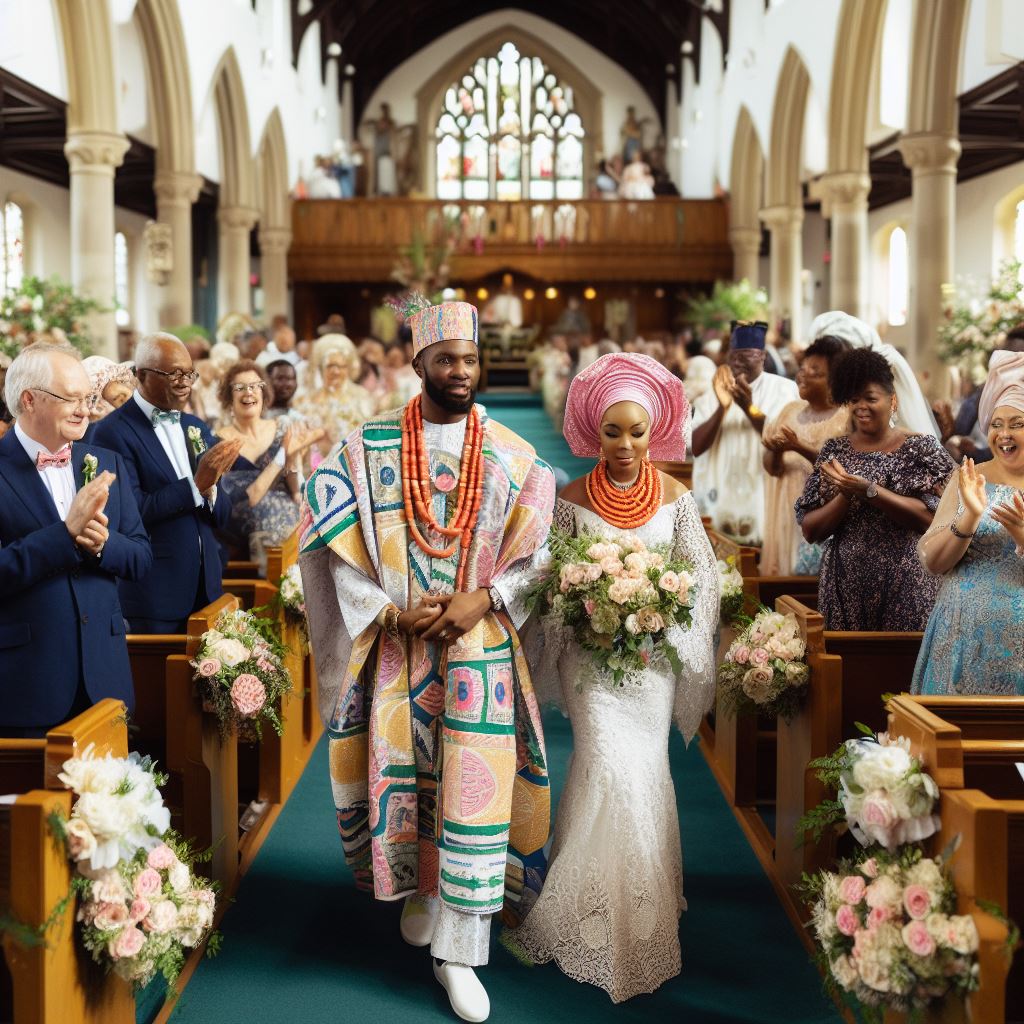Introduction
The Role of Faith in a Marital Relationship is that of a foundational pillar, uniting and sanctifying the bond between partners.
It provides couples with a strong sense of purpose and direction, guiding their actions and decisions.
With faith, couples believe that their marriage is a divine union, blessed by God.
In Nigeria, a country deeply rooted in religious beliefs, faith plays a paramount role in sustaining marital relationships.
Couples rely on their faith to navigate challenges and strengthen their bond. They seek solace in prayer, trusting that God will provide guidance and support.
Faith instills values such as commitment, forgiveness, and selflessness in couples.
It encourages them to prioritize their relationship, putting each other’s needs above their own.
Obedience to religious teachings reinforces the sanctity of marriage, discouraging infidelity or divorce.
Moreover, faith fosters communication and understanding between spouses.
It encourages open dialogue about their beliefs, values, and goals, leading to better compatibility and cohesion within the marriage.
Through shared religious practices and rituals, couples find common ground that strengthens their marital bond.
In times of adversity, faith acts as an anchor, preventing the marriage from being easily swayed by external pressures.
It instills hope and resilience, enabling couples to persevere through challenges and emerge stronger together.
By placing their trust in a higher power, couples find comfort in knowing that they are not alone in their journey.
Basically, faith is an integral pillar that upholds sanctified marital relationships in Nigeria.
It provides couples with a sense of purpose, values, and strength that guide them throughout their journey.
By embracing their faith, couples can build a strong foundation and navigate the complexities of married life with grace and perseverance.
The Influence of Cultural and Religious Background
In the context of upholding a sanctified marital relationship, cultural and religious backgrounds play a significant role.
This section explores the influence of cultural and religious beliefs in Nigeria on marital relationships.
Nigerian cultural values and traditions
Nigeria is a culturally diverse country with over 250 ethnic groups.
Each group has its unique cultural practices, beliefs, and values that influence their marital relationships.
These values include respect for elders, communal living, and the importance of family unity.
Dominant religions in Nigeria
The two major religions in Nigeria are Christianity and Islam.
These religions shape the worldview and practices of Nigerian individuals and greatly influence their marital relationships.
How cultural and religious beliefs shape marital relationships
- Shared values and expectations: Cultural and religious beliefs provide a foundation for shared values and expectations in a marital relationship. These shared values facilitate communication, understanding, and mutual cooperation.
- Gender roles and responsibilities: Cultural and religious beliefs often define specific gender roles and responsibilities within a marriage. These roles can influence decision-making, division of labor, and power dynamics within the relationship.
- Influence on decision-making processes: Cultural and religious beliefs may impact the decision-making processes in a marital relationship. In some cultures, decisions are made collectively, involving extended family members or religious leaders, while others prioritize the authority of the husband or wife.
Examples of specific cultural and religious practices related to marriage
- Traditional marriage ceremonies: Nigeria has diverse traditional marriage ceremonies, each with its unique customs and rituals. These ceremonies often involve the exchange of gifts, payment of dowry or bride price, and the involvement of community members.
- Dowry and bride price customs: In many Nigerian cultures, the groom is required to pay a dowry or bride price to the bride’s family. This practice symbolizes respect, commitment, and the value placed on the bride.
- Importance of extended family support: Nigerian cultural and religious beliefs emphasize the significance of extended family support in marriage. Extended family members play active roles in providing guidance, mediation, and support during challenging times.
- Influence of religious teachings on fidelity and commitment: Both Christianity and Islam in Nigeria promote fidelity, commitment, and the sanctity of marriage. Religious teachings encourage couples to remain faithful, forgive each other, and seek resolution in times of conflict.
Generally, cultural and religious backgrounds significantly impact marital relationships in Nigeria.
These influences shape shared values, gender roles, decision-making processes, and specific practices related to marriage.
Understanding the role of faith within these cultural and religious contexts is essential in upholding a sanctified marital relationship.
Read: Advice for Newlyweds: Navigating the Journey with Hebrews 13:4
Faith as a Foundation for Trust and Commitment
Importance of trust in a marriage
- Trust forms the bedrock of a solid and sanctified marital relationship.
- Without trust, spouses struggle to maintain a healthy and fulfilling union.
- Trust allows couples to rely on each other, fostering a sense of security and emotional connection.
How faith reinforces trust between spouses
- Having faith in one’s partner allows trust to grow and flourish.
- Believing in the goodness and sincerity of one’s spouse builds a strong foundation for trust.
- Through faith, couples can navigate challenges together, knowing they are bound by their shared beliefs.
- Faith provides reassurance that both partners are committed to upholding the sanctity of the marital bond.
Religious teachings on commitment and loyalty in marriage
- Many religions emphasize the importance of commitment and loyalty in marriage.
- Religious teachings guide spouses to stay faithful to one another and support each other unconditionally.
- These teachings instill a sense of responsibility, encouraging couples to prioritize their marital vows.
Real-life examples of faith-based trust and commitment in Nigerian marriages
- In Nigerian culture, faith plays a central role in upholding trust and commitment in marriages.
- Spouses rely on their faith to overcome challenges, trusting that God will guide them through difficult times.
- They demonstrate unwavering commitment to their partners, even in the face of adversity.
- Nigerian couples often draw strength from their shared religious beliefs to maintain a sanctified marital relationship.
Essentially, faith serves as a vital foundation that nurtures trust and commitment within a sanctified marital relationship.
Trust enables spouses to rely on each other, fostering emotional connection and security.
Faith reinforces trust by providing belief in the goodness and sincerity of one’s partner.
Religious teachings on commitment and loyalty guide couples to prioritize their marriage vows.
Real-life examples in Nigerian marriages demonstrate the strength of faith-based trust and unwavering commitment.
By relying on their shared beliefs, couples can navigate challenges and uphold the sacredness of their union.
Read: Nigeria’s Traditional Marriages and The Biblical ‘Honourable’ Union
Faith as a Guide for Decision-Making and Conflict Resolution
Faith plays a significant role in upholding a sanctified marital relationship.
It serves as a guiding force, providing couples with strength, wisdom, and clarity amidst the complexities of married life.
In this section, we will explore how faith acts as a compass for decision-making and conflict resolution within a marriage.
Seeking guidance from religious leaders or scriptures
When faced with important decisions or conflicts, couples often turn to their religious leaders or seek solace and direction through the teachings in their sacred scriptures.
These spiritual resources offer profound insights, advice, and perspectives that can help couples navigate through difficult situations.
By seeking the counsel of religious leaders or studying their scriptures, couples can find clarity and guidance in making decisions that align with their faith and values.
Faith-based principles and values for decision-making
Faith provides a strong foundation for decision-making within a marriage.
Couples who are firmly rooted in their faith often base their choices on principles and values derived from their religious teachings.
These principles may include love, honesty, selflessness, unity, and commitment.
By incorporating these values into their decision-making process, couples can ensure that their choices are in harmony with their beliefs and contribute to the sanctity of their marital relationship.
Role of forgiveness and compassion in resolving conflicts
Conflict is inevitable in any marriage, but faith equips couples with valuable tools to resolve conflicts effectively.
One of these tools is forgiveness.
Faith teaches the significance of forgiveness as an essential component in maintaining a healthy relationship.
By forgiving each other for mistakes, misunderstandings, or hurtful actions, couples can avoid resentment and work towards healing and reconciliation.
Compassion is another vital aspect of conflict resolution in a faith-based marriage.
Having compassion means understanding and empathizing with the other person’s perspective, acknowledging their emotions, and treating them with kindness and empathy.
Through compassion, couples can build bridges and find common ground, paving the way for peaceful resolutions and greater marital harmony.
Stories of couples using faith to overcome challenges and make wise decisions
There are countless inspiring stories of couples who have relied on their faith to overcome challenges and make wise decisions.
These stories serve as a testament to the power of faith in strengthening and sanctifying marital relationships.
Couples have shared accounts of seeking guidance from their religious leaders, finding solace in prayers and meditation, and receiving divine inspiration that has guided them through difficult times.
In these stories, faith not only empowers couples to overcome challenges but also helps them make wise decisions that align with their highest values.
By surrendering their individual wills and submitting to a higher power, couples find clarity, peace, and the strength to navigate through the complexities of married life.
In general, faith serves as a guide for decision-making and conflict resolution within a sanctified marital relationship.
Couples can seek guidance from their religious leaders or scriptures, apply faith-based principles and values to their decision-making process, and utilize forgiveness and compassion to resolve conflicts.
Through stories of couples using their faith to overcome challenges and make wise decisions, we witness the transformative power of faith in upholding a sanctified marital relationship.
Read: Benefits of a God-Centered Marriage: Insights from Hebrews 13:4

Faith and Shared Values for Building a Strong Marital Foundation
Identifying and aligning core values
- Core values are essential for a strong marital foundation as they form the basis of a couple’s beliefs and priorities.
- Faith plays a crucial role in helping couples identify and align their core values.
- Shared faith allows couples to establish a common set of values, fostering understanding and unity.
- When spouses share the same values, it becomes easier to make important decisions and handle conflicts.
- Identifying and aligning core values also helps with creating a cohesive vision for the future.
How faith helps reinforce shared values
- Faith provides a moral compass that guides couples in upholding their shared values.
- Religious beliefs and teachings often emphasize principles such as love, forgiveness, and commitment.
- Through faith, couples are reminded of the importance of practicing kindness, respect, and empathy.
- Shared faith encourages couples to support each other in upholding their shared values, particularly during challenging times.
- Regular engagement in religious activities strengthens the bond between couples, reinforcing their shared values.
The role of marriage counseling in strengthening shared values
- Marriage counseling offers a platform for couples to explore and reinforce their shared values.
- Counselors help couples identify any conflicts or gaps in their core values, providing strategies for resolution.
- Counseling sessions may involve discussions on how to incorporate faith and shared values into daily life and decision-making.
- Professional guidance from counselors can help couples navigate differences and find common ground.
- Marriage counseling reinforces the importance of shared values as a foundation for a sanctified marital relationship.
Success stories of Nigerian couples who attribute their longevity to shared faith and values
- Many Nigerian couples credit their long-lasting marriages to a shared faith and values.
- These couples believe that their strong foundation in faith has helped them navigate various challenges.
- Shared values of respect, loyalty, and commitment have allowed these couples to build lasting connections.
- Through their faith, these couples have found strength, love, and fulfillment in their marital relationships.
- Their success stories serve as inspiration for others seeking to cultivate a sanctified marital relationship based on shared faith and values.
In essence, faith plays a pivotal role in upholding a sanctified marital relationship.
It allows couples to identify and align their core values, reinforcing their shared principles.
Marriage counseling serves as a valuable tool in strengthening shared values, while success stories from Nigerian couples attest to the power of faith in building strong foundations.
Ultimately, a sanctified marital relationship rooted in faith and shared values provides couples with a firm grounding for a fulfilling and enduring union.
Read: The Role of Religion in Marriage Counseling in Nigeria
Faith as a Source of Emotional and Spiritual Support
A strong, shared faith can be a cornerstone in building a sanctified marital relationship.
Let’s explore the emotional and spiritual sustenance it offers.
The Emotional Benefits of a Shared Faith
- Faith fosters trust and understanding between partners.
- It encourages empathy, promoting emotional bonding.
- Shared beliefs provide a sense of unity and purpose.
- Couples often report reduced conflicts due to their common faith.
- Spiritual connection deepens emotional intimacy.
How Prayer and Spiritual Practices Enhance Emotional Well-being
- Regular prayer promotes inner peace and reduces anxiety.
- Spiritual practices instill a sense of gratitude and contentment.
- Couples find solace in shared rituals and spiritual growth.
- Meditation and mindfulness strengthen emotional resilience.
- A strong faith foundation aids in stress management.
Role of Religious Communities in Providing Support for Couples
- Religious congregations offer a sense of belonging.
- Couples benefit from the wisdom of experienced community members.
- Support groups within faith communities address marital challenges.
- Community events and counseling services reinforce relationships.
- Religious leaders provide guidance and counsel.
Testimonies of Couples Finding Solace and Strength through Their Faith During Difficult Times
- Struggles can test a marriage, but faith provides hope.
- Couples have shared stories of faith sustaining them through illness.
- Financial crises are often overcome through mutual faith.
- In times of loss, faith can be a healing balm.
- Faith becomes a source of resilience, strength, and enduring love.
In a nutshell, faith acts as an emotional and spiritual anchor, fortifying the bond within a sanctified marital relationship.
It provides couples with a wellspring of support, enabling them to navigate life’s challenges with grace and unity.
Conclusion
Recap of the role of faith in upholding a sanctified marital relationship
Throughout this blog post, we have explored the significant role that faith plays in upholding a sanctified marital relationship.
We have discovered that faith serves as a strong foundation, guiding couples through the ups and downs of marriage.
Restatement of the significance of faith in Nigerian marriages
In the context of Nigerian marriages, faith plays an even more crucial role.
It serves as a central pillar that fosters love, respect, and commitment in relationships, and it acts as a source of wisdom and guidance.
Closing thoughts
It is essential for couples to recognize the importance of embracing and nurturing their faith.
By constantly seeking God’s wisdom and strength, couples can overcome challenges and build a strong, sanctified marital bond.
Remember, faith is not a passive entity but an active force that requires consistency, dedication, and intentional effort to thrive.
By prioritizing faith and allowing it to shape their marriage, couples can genuinely experience a sanctified and fulfilling union.




